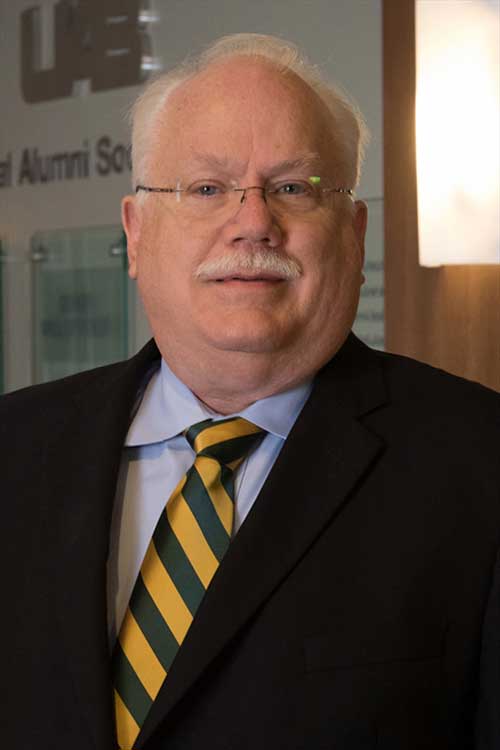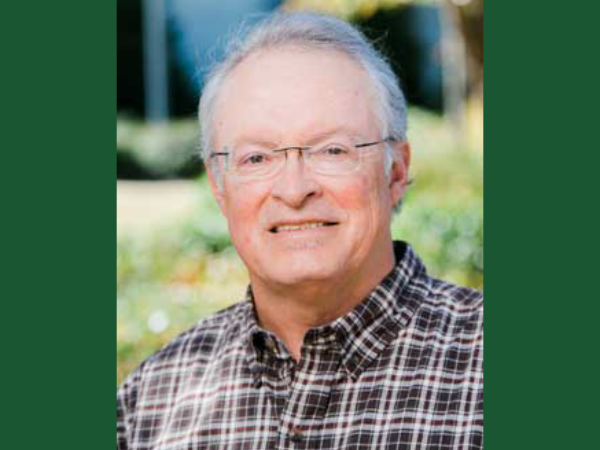When Johnny Edward “Rusty” Bates, M.D., was growing up in Sipsey, Alabama, he viewed his father, a draftsman and engineer, as one of the smartest people he knew.
“My father was an inspiration,” said Bates.
Although his father, Henry E. Bates Jr., was both skillful and knowledgeable, he was limited in his ability to advance in his career due to his academic credentials. According to Bates, “He always felt that not having his degree impeded his ability to move up the ranks.”
 Johnny Edward “Rusty” Bates, M.D.For Bates, this observation about his father serves as an enduring source of inspiration, both in his academic journey and his professional career.
Johnny Edward “Rusty” Bates, M.D.For Bates, this observation about his father serves as an enduring source of inspiration, both in his academic journey and his professional career.
While in middle and high school, Bates excelled in mathematics and learned from nurturing teachers who helped him establish a strong foundation in the discipline. As he looked to his future, he decided to pursue a degree in mathematics, while also working full-time. He briefly attended Birmingham-Southern College, then enrolled at Walker College to earn his associate degree.
He envisioned attending the University of Alabama at Birmingham after Walker College, but he faced a financial barrier. “I didn’t come from a wealthy family,” said Bates. Thankfully, he received a generous scholarship, which helped him scale the barrier. That scholarship, which came from a wealthy businessman, set him on a new academic trajectory.
He enrolled at UAB and earned a B.S. in Mathematics and a minor in art history. During his time as an undergraduate at UAB, he saw and appreciated the level of care and excellence his professors brought to the classroom each day.
“I had a great experience with great educators,” said Bates. “They loved teaching. [My professors] took an interest in me as a student. They wrote letters for me when I applied to medical school.”
After completing his undergraduate degree, Bates was accepted into the Heersink School of Medicine. He earned an M.D. in 1982, then completed his residency at University of Texas in Galveston.
Through his studies and training, Bates became deeply interested taking care of populations of patients, rather than focusing on individual patients. He decided he wanted to become a leader in correctional care, so he started his own company, Quality Correctional Healthcare (QCHC).
While Bates studied mathematics and medicine at UAB, he enjoyed solving problems and making decisions that would improve outcomes. Nowadays, he applies those same skills at QCHC. “I’m going to use those techniques to improve our overall services. We’re going to need to find smarter and better ways of doing things,” said Bates.
He has continued his academic journey to support these goals too. He earned a Master of Medical Management for Physicians from Carnegie Mellon University, and, recently, he started taking courses in artificial intelligence and machine learning from the University of Texas at Austin and the Massachusetts Institute for Technology.
Bates still looks back on the scholarship that helped him establish his academic foundation at UAB with gratitude, while also considering the obstacles his father faced. Moving forward, he wants to support future students as they pursue degrees in mathematics and honor his father at the same time. Given these priorities, Bates recently established the Henry E. Bates Jr. Endowed Scholarship in Mathematics, which will benefit undergraduate mathematics students who demonstrate strong academic promise.
“I think everybody who desires an education should be able to get an education,” said Bates. “I want to be able to benefit someone who has that desire but may not have the resources to get the degree.”
Clearly, Bates’s generosity and admiration for his father are reflected in this endowed scholarship in the Department of Mathematics.


